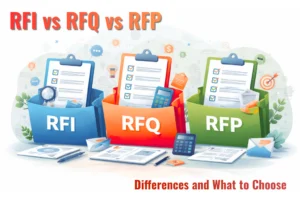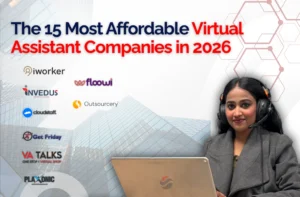
Popular Virtual Assistant Services in 2026: What’s in Demand?
Virtual assistant services aren’t what they used to be, and that’s a good thing!
What started as basic admin help has grown into something much bigger. In 2026 and beyond, businesses are leaning on VAs to handle high-skill work in marketing, tech, sales, customer service, and more.
According to recent data, the global virtual assistant market is set to hit $8.6 billion by 2030, growing at a steady 22.3% CAGR. That’s not hype; it’s a clear sign that companies aren’t just experimenting with VAs anymore.
The rise of AI tools, automation platforms, and remote-first teams has changed what’s possible. Founders now want VAs who can write a landing page, run analytics, manage content pipelines, or even build out workflows. The best virtual assistant companies are responding by sourcing specialist VAs for every role!
So, what exactly are businesses outsourcing in 2026?
Which roles are driving real impact?
That’s what this blog is about. We’ll list the popular virtual assistant services that are in highest demand and why they matter right now.
Let’s get started!
Clear Your Basics: What Does a Virtual Assistant Do? Services, Skills, Tasks & Costs Explained
What Are The Most Popular Types of Virtual Assistants Services in 2026?
In upcoming years, businesses are no longer hiring virtual assistants just to “help out.” They’re hiring to fill specific roles in fast, affordable, and often remote settings. From day-to-day ops to high-level strategy, the range of VA capabilities has never been wider.
Below, we’ve mentioned clear categories and what tasks fall in each category so you can see exactly which services are in high demand right now and what kind of VA to look for.
1. Operational & Administrative Support
If your daily tasks are piling up and slowing you down, this is where a VA can step in and take over the basics without missing a beat. These are the classic virtual admin assistant services, now leveled up with better tech skills and VA tools.
- Calendar and inbox management.
- Travel planning and document prep.
- Executive virtual assistant services for founders and senior staff.
- Project and task coordination via tools like Asana, ClickUp, and Notion.

2. Customer-Facing Services
Customer support is about protecting trust. Virtual assistants in this role handle first contact across email, live chat, and social DMs so you can respond faster, manage more queries, and avoid team burnout. From answering FAQs to escalating issues or moderating communities, they help you stay reliable where it counts.
- Omnichannel support (live chat, email, and DMs).
- Customer success onboarding and renewal follow-ups.
- Community moderation on Slack, Discord, and Facebook.
- Influencer/UGC coordination with your brand team.
3. Sales & Lead Generation
A virtual assistant for sales helps you stay on top of outreach, follow-ups, and CRM updates so leads don’t go cold and your team doesn’t burn out chasing them. They keep your pipeline moving while you focus on closing.
- Cold outreach via LinkedIn and email.
- CRM management (HubSpot, Zoho, Pipedrive).
- Sales follow-ups and opportunity tracking.
- Virtual SDRs who handle prospecting and scheduling Automated prospecting and follow-ups powered by an AI SDR, enabling scalable, always-on lead generation without increasing headcount.
4. Digital Marketing Execution
This is one of the fastest-growing areas in the VA space. Today’s marketing virtual assistant services are posting content, but they’re also setting up automation, writing copy, and tracking performance.
- Email marketing campaigns (A/B testing, automation flows).
- Content writing, repurposing, and scheduling.
- SEO blog support and podcast scripting.
- Affiliate coordination and outreach for partnerships.
5. Social Media & Content Strategy
If you’re struggling to keep your brand visible, social media virtual assistant services can take the load off. From reels to carousels to community comments, these VAs are built for engagement.
- Managing social commerce (TikTok Shops, Instagram, Facebook Marketplace).
- Designing graphics and editing short-form video.
- Scheduling posts and tracking analytics with Buffer or Hootsuite.
- Strategy and growth support across Pinterest, YouTube, and LinkedIn.
6. E-commerce & Product Operations
Online stores need constant attention. Ecommerce virtual assistant services help business owners stay on top of logistics, listings, and customer support without burning out internal teams.
- Product listings on Shopify, Amazon, Etsy.
- Order and return processing.
- Customer inquiry handling.
- Digital product management for courses, ebooks, and downloads.
7. Tech & Automation Roles
Virtual assistants in this category help automate your tools and simplify workflows. They connect platforms like Zapier, Notion AI, or ChatGPT into your existing systems so everything runs with less input from you.
- Workflow building and automation setup.
- CRM and email funnel integrations.
- Newsletter forms, tagging, and list cleanups.
- Prompt tuning and lightweight AI tool management.
8. Analytics & Insights
If your reports are always late or your dashboards don’t tell you anything, this is your fix. Data-focused VAs can track what matters and present it in a way that helps you act fast.
- Weekly KPI and campaign tracking.
- Google Analytics setup and review.
- Visualization dashboards (Looker Studio, Airtable, Sheets).
- Customer trend forecasting and insight mapping.
9. Event, Webinar & Launch Coordination
Running virtual events or launching new products? A personal virtual assistant skilled in logistics and follow-up can make it all feel effortless for your team and seamless for your audience.
- Speaker and guest coordination.
- Pre-event promotion and reminder sequences.
- Landing page creation, event registration platform, and funnel support.
- Post-event follow-ups and feedback form handling.
10. Industry-Specific VA Services
Need someone who already knows your field? The most effective types of virtual assistants services today are industry-specific. They walk in with context, tools, and readiness.
- Real Estate VAs: manage listings, client inquiries, and showings.
- Medical VAs: handle billing, reminders, and insurance tasks.
- Legal VAs: support with contracts, research, and e-discovery.
- Creative VAs: podcast management, Canva work, and video editing.
No matter your industry, there’s a virtual assistant out there already trained to handle the exact tasks you’re tired of doing. Instead of hiring a generalist and hoping for the best, businesses are choosing VAs with sharp skills, domain experience, and the ability to plug in fast.
Which Trends Are Reshaping Virtual Assistant Roles in 2026?
Most people still think virtual assistants are just affordable admin help. In 2026, that mindset is holding businesses back.
The reality? VA services have moved way past inboxes and calendars. Businesses are no longer hiring for convenience; they’re hiring for capability. Four big shifts are driving this change:
- Specialists Are In, Generalists Are Out: “Can you do everything?” is no longer a selling point. Founders want a VA who knows exactly how to fix their CRM, build a funnel, or manage influencer partnerships without needing a two-week handover doc. Niche wins because it saves time, reduces friction, and actually gets results.
- No-Code Tools Rewrote the Job Description: Zapier, Notion AI, and ChatGPT—all these aren’t optional anymore. If your VA can’t automate a workflow or plug into your stack, they’re not helping you grow. The rise of no-code has pushed VAs up the value chain and out of the low-skill loop.
- Data Privacy Is Now a Dealbreaker: You wouldn’t hand your Stripe or HubSpot login to just anyone. As VAs take on more strategic work, trust and compliance matter more. The best virtual assistant for small business is now someone who gets your tools and your non-negotiables.
- Pay for Results, Not Time: Wondering how much does it cost to hire a virtual assistant? That depends—are you hiring for hours or outcomes? In 2026, nobody’s paying for “busy.” They’re paying for booked calls, clean pipelines, shipped assets, and closed tickets.
The job of a VA has evolved. If you’re still hiring generalists by the hour, you’re behind. The top businesses are building lean, skilled, outcome-driven remote teams that scale better than any full-time hire ever could.
Which VA Services Suit What Kind of Business?
Not every business needs the same kind of support. The real advantage of hiring virtual assistants in 2026 is how easily you can tailor their roles to your model, workload, and goals.
Whether you run a solo operation or manage a growing team, here’s a quick guide to the best-fit VA services based on your business type:
| Business Type | Top VA Tasks | Best-Fit Support |
|---|---|---|
| Solopreneurs & Freelancers | – Inbox and calendar management – Client onboarding and contract prep – Social media post scheduling | A flexible, all-rounder virtual assistant for online business that can manage admin and light marketing. |
| Coaches & Consultants | – Lead follow-up and CRM updates – Webinar and podcast coordination – Slide deck creation and email sequences | VAs who can keep launches and client pipelines running without constant supervision. |
| E-commerce Stores | – Order processing and product listing updates – Customer support via email/chat – Inventory and return coordination | Outsource virtual assistants trained in platforms like Shopify, Etsy, and Amazon. |
| Agencies | – Client reporting and campaign support – Prospecting and outbound lead gen – Blog uploads, podcast publishing, SOP documentation | Multiple niche VAs working across content, design, and admin. |
| SaaS Startups | – Customer success ticket handling – Product walkthroughs and feedback collection – Knowledge base documentation | A technical VA who understands onboarding flows and customer retention. |
No matter your business model, there’s a VA role designed to save you time, tighten operations, and help you scale. The trick isn’t just hiring virtual help; it’s knowing what to delegate and who’s best equipped to handle it.
That’s where strategic outsourcing wins.
How to Choose the Right Virtual Assistant Service for Your Business?
If you’re early-stage, a flexible, outsourced virtual assistant who can take care of admin, emails, and social media might be all you need. For growing teams, niche specialists (like CRM managers or content VAs) help you delegate deeper and move faster. At the enterprise level, full-service agencies offer plug-and-play scale with built-in oversight.
Tool alignment matters too. If your team works in Asana, Notion, or HubSpot, your VA should already know the ropes. The same goes for AI stacks; many modern VAs now work with tools like ChatGPT, Zapier, and Mailchimp automations.
Pricing will vary. Based on recent data, generalist roles cost between $8 and $12 per hour offshore, while skilled specialists or US-based VAs range from $15 to $45 per hour. Agencies or bundled services may charge more but offer added management and reliability.
Choosing the right virtual assistant means aligning skills, VA tools, and flexibility with your business goals—not just ticking off tasks. Our guide, How to Hire a Virtual Assistant the Right Way, shows you how to make the smart choice.
Ready to Build a Smarter Support Team?
If you are outcome-driven, finding the talent as per the most in demand virtual assistant services might eat away your time. Invedus can help you save this time and find a talent that fits both your budget and requirements.
Invedus is an ISO 27001 certified company that helps businesses and entrepreneurs hire full time virtual assistants without the overhead that comes with employing in-house talent. You get a trained, reliable, and ready-to-go assistant that starts working from day one.
There’s no catch: Contact us today!





Last updated on: Jan 21, 2026